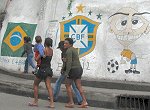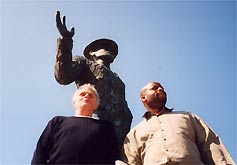|
 |
| Volume No. 1 Issue No. 26 - Friday August, 2002 |
 Dominican Sociologist Gains International Spotlight Dominican Sociologist Gains International Spotlight
Sociologist Featured on BBC World Service Radio

by:Thomson Fontaine

The
cutting-edge research been conducted by Dr. Peter St. Jean (inset) continues to draw the attention of the international press and governments the world over. While completing his doctoral studies at the world renowned University of Chicago sociology department, Dr. St. Jean conducted most of his research in the South Side of Chicago in a place called Bronzeville one of the most violent, crime-ridden, drug-infested neighborhoods in the United States.
 It was his research in this area, which drew famed BBC reporter Laurie Taylor from the comforts of London to the desolate streets of South Side Chicago. There, he examined Dr. St. Jean's research first hand and discussed with him his findings and his unique place among the great sociologists. The story was aired on radio and printed on the internet under the topic Thinking Allowed in Chicago: In the Footsteps of the Great Chicago Ecologists. It was his research in this area, which drew famed BBC reporter Laurie Taylor from the comforts of London to the desolate streets of South Side Chicago. There, he examined Dr. St. Jean's research first hand and discussed with him his findings and his unique place among the great sociologists. The story was aired on radio and printed on the internet under the topic Thinking Allowed in Chicago: In the Footsteps of the Great Chicago Ecologists.
The radio dialogue gives an amazing account of the clashing of two worlds as Dr. St. Jean takes Mr. Taylor to the downtrodden neighborhood of Bronzeville that he has studied for the past five years. In his report, Mr. Taylor remarks that the book that Dr. St. Jean is now writing should take its place among the original classic sociological studies written by famed former University of Chicago sociologists like Cayton and Drake (The Black Metropolis, 1945) and Frederic Thrasher (The Gang, 1927).
Like the Tale of Two Cities, the interview with Dr. St Jean is fascinating in its coverage of crime, a forgotten people and race in America. Mr. Taylor refers to Dr. St. Jean as a hero for venturing into places where very few visitors have been, and only the very brave dare to thread. "He doesn't judge, he doesn't moralize, he looks.."
Dr. St. Jean remarks on seeing persons shot before his eyes, on having to deal almost daily with the horror of crime, of seeing the cracked lips of the drug addict, and when it is almost too tragic and too humiliating to bear, he deals with the pain of it all by laughing at the apparent paradoxes.
It was Dr. St. Jean's ability to laugh at this seeming madness, which made Studs Terkel, American author and actor draw parallels with a suggestion made by Dr. Martin Luther King. Terkel recounts in the report how, on the visit of Dr. King to the divided city of Chicago in the sixties after encountering a humiliating racist episode, how Dr. King, ventured that "...black people laugh at their humiliation because it was safety- valve, it is a healing quality, we laugh to keep us from crying".
Dr. St Jean's work was not confined to the classroom. He risked his life to walk the dreaded streets of South Side Chicago, to document a city of crime and try to impose some understanding on a place seemingly gone mad.
In the interview, here is how Mr. Taylor describes South Side: " ..a place where people who are already victims are further victimized by their neighbors...an area where fifty thousand people spend much of their time staring at vandalized houses, boarded up shops, dangerous wastelands have to look up to see the mocking opulent towers of downtown Chicago."
A veteran of the US Army National Guard (1986-1998) in St. Thomas, New Jersey, and Washington State, Dr. St Jean has also done research on community policing in Grand Bay, Dominica. He was recently invited by the Government of Brazil to assist in their efforts to help reduce crime in that country (see story).
Dr. St. Jean is currently employed as an Assistant Professor of Law and Society at the State University of New York, 430 Park Hall, Box 604140
Buffalo, New York 14260-4140
I would invite our readers to listen to this spell binding interview on BBC radio over the internet by going to BBC radio Audio interview with Dr. St. Jean.

|
|
 |


|






